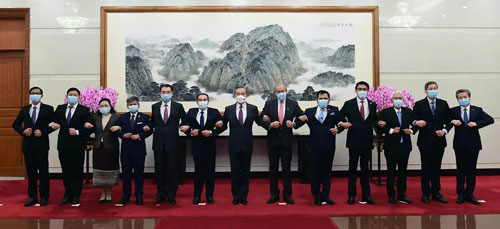In the evening of the November 14th, 2021, Wang Yi, member of the State Council and minister of foreign affairs, met envoys from countries of ASEAN.
Wang Yi said that China had been the neighbour with the largest area and the most reliable long-term strategic partnership. China had been supporting the construction of an ASEAN community and the central position of ASEAN in it’s regional cooperation structure. Since the outbreak of the pandemic, there had been close communication and mutual support between Chinese president Xi Jinping and heads of ASEAN countries, so as to further solidify the friendly cooperation between the two sides. Not long ago, held the summit to memorize the 30th anniversary of the establishment of the interaction relationship between China and ASEAN. This was a mark with which we could figure out the plan and the direction for the bilateral relationship of the next 30 years. With opportunities provided by the summit and the 30th anniversary as the momentum, China would like to work together with ASEAN to overcome the pandemic, promote economic recovery and growth, safeguard regional peace, stability and prosperity, support regional integration and economic globalization and practice multilateralism and an open regionalism, so as to step on the path to build a closer China-ASEAN community with a shared future.
Wang Yi said that China would continue to offer vaccine support to ASEAN countries until the pandemic was overcame jointly. He expected that ASEAN countries would cooperate with China to start China-ASEAN free trade zone 3.0; improve cooperation in digital, green economy and other fields; discuss new, free and convenient measures of trade and investment and implement “Agreement for Regional Economic Partnership in All Aspects” on time, so as to inject strong driving force to regional economic recovery and development. In the 76th General Debate of the General Assembly, Chinese president Xi Jinping brought up the “global development initiative” whose goal was to promote the UN 2030 sustainable development agenda. This had gained the support of the UN and many countries. China had been working with ASEAN countries to focus on the theme of development and making contribution.
Wang Yi said that China and ASEAN countries had been placing problems concerning the South China Sea in a suitable position and promoting bilateral cooperation. The next year would witness the 20th anniversary of the signing of the “Declaration on the Conduct of Parties in the South China Sea”. He hoped that this would be an opportunity to implement the declaration and to accelerate the negotiation of the “the Code of Conduct in the South China Sea”, so as to safeguard the safe and stability of the South China Sea and to seek win-win cooperation.
Wang Yi introduced to ambassadors the major achievements of the 6th Plenary Session of the 19th Central Committee. The declaration passed in the conference would lead China to step toward the second centenary goal. China’s development and rejuvenation indicated an increase of peaceful strength which would contribute more to the Chinese nation as well as the peace and development of the world.
ASEAN countries’ ambassadors to China expressed their congratulations to the successful opening of the 6th plenary meeting of the 19th central committee. They gave high comment to the achievement of China’s bilateral relations with ASEAN countries and said thanks to China’s support for ASEAN countries to fight against the pandemic and to recover economy. They showed their nations’ willingness to held the summit to memorize the 30th anniversary of the dialogue to seize opportunities and cope with challenges as well as to push forward a strategic partnership in all aspects that was with win-win cooperation and strategic and practical significance. Chinese government brought up the “global development initiative” which was helpful to speed up the UN 2030 sustainable development agenda. ASEAN countries were confident for China’s development. They expected to improve it’s cooperation with China in terms of economy, trade, green economy, climate change, people-to-people exchanges, sustainable development and other fields, so as to create more welfare for people and to promote regional peace, stability and prosperity.
Both sides exchanged ideas on international and regional issues that both sides concerned.
